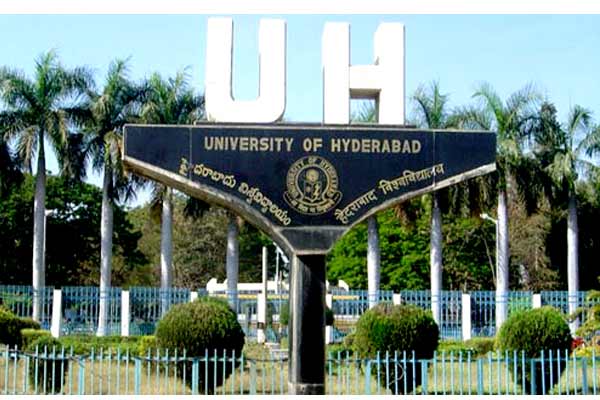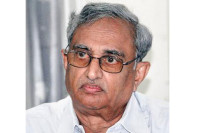
– Dr EAS Sarma. IAS(rtd),
Former Secretary,
Government of India
The unfortunate death of V. Rohit, a dalit research scholar at the Hyderabad Central University (HCU) raises important concerns about the state of affairs in our academic institutions and the sensitivity or the lack of it, of the government and the institutions towards the Dalits.
The University of Hyderabad Act of 1974 envisages the institution to be an autonomous one administered by a well defined hierarchy of statutory bodies, namely, the Court, the Executive Council and the Academic Council. The President of India as the “Visitor” and the Governor of the State as the “Chief Rector” are expected to exercise supervision over these bodies in accordance with the provisions of the Act. It is the Visitor who appoints the Chancellor and the Vice-Chancellor (VC) of the University to perform the functions as defined in the Act. The VC is the principal executive and academic officer of the University.
It is the President of India as the Visitor of the University who should exercise overall supervision on the affairs of the University. As per the provisions of the HCU Act, neither the concerned Central Ministries nor any Union Minister can interfere in the functioning of the University. The responsibility of the Central Ministry of Human Resources Development (MHRD) is to help the government in framing higher education policy and remain accountable to the Parliament on behalf of the political executive.
The Act envisages the process of appointment of the senior functionaries of the University to be apolitical and transparent.
In the normal course, had a transparent and an apolitical process been adopted for selecting the VC of the University and an equally transparent and an apolitical procedure followed for the selection of the other senior functionaries, one could have expected those functionaries to discharge their responsibilities in accordance with the letter and the spirit of the HCU Act. One wonders whether such a transparent process had indeed been followed in the case of HCU. In the recent times, there have been instances of undue interference from MHRD in the selection of senior functionaries of some of our premier academic institutions. For example, a well known scientist who was the Chairman of the Board of Governors of IIT, Mumbai had chosen to resign from that office on the ground that there was an undue interference in a selection process. Such interference does not augur well for the credibility and the effectiveness of our academic institutions.
Coming to the role of he Union Ministers and the Union Ministry of Human Resources Development (HRD), one expects them to function independent of their political affiliation so as to uphold the spirit of fairness and objectivity in governance. They are not expected to take sides with student bodies having affiliation with one political party or the other, nor are they expected to do anything that dilutes the autonomy of an academic institution. In the instant case of HCU, this norm seems to have been transgressed. For example, earlier, in the case of IIT, Chennai, the Ambedkar-Periyar Study Circle (APSC) was treated in the same way that the Ambedkat Students Association (ASA) of HCU has now been treated. Such instances bring down the credibility of governance.
In the conduct of the university’s day-to-day affairs, the authorities are expected not to discriminate the students and the faculty on the basis of their class, caste, creed, religion, language, culture and so on. The authorities of HCU are also expected to make sure that the environment in which the affairs of the University are conducted is such that no section of the student community and the faculty feels discriminated against and excluded. The fact that Rohit was forced to take away his life and the fact that there were similar instances in the past indicate that all is not well with the HCU. Considering that similar instances had taken place earlier in other academic institutions, it appears that, while selecting the senior functionaries of the academic institutions, in addition to professional competence alone, sensitivity to the interests and concerns of the Dalits and the minorities should be adopted as an overarching criterion. Otherwise, the academic institutions of the country will soon degenerate into bodies without a soul. If this criterion is not adopted, there will be many more instances of the kind now seen in HCU. One shudders at that thought.
Finally, in the case of the ASA in HCU and APSC in IIT, Chennai, sections of the student community having affiliation with one political ideology seemed to have branded the other groups as “casteist”, “extremist” and “anti-national” for having voiced a view different from theirs. In both the cases, the political executive, without acting in an objective manner, seemed to have taken such hasty measures that ended up in victimising the dissenters and suppressing the dissenting voices. This is a trend that needs to be curbed as no one in the country, except the judiciary, has the right to interpret the provisions of the Constitution in relation to what amounts to an “extremist”, “anti-national” or a sectarian act. Freedom of expression is a fundamental right and the political executive cannot choke that right except within the narrow definition of “reasonable restrictions” laid down in Part III (Fundamental Rights) of the Constitution. Especially in academic institutions, voices of dissent are central to a healthy debate. Debate is essential for academic progress. India’s socio-economic concerns are deep-rooted and they need to be debated openly and without any refrain or hesitation. One of the primary objectives of education in India should be to remove social exclusion altogether.
In Dr. Ambedkar’s words, “in an ideal society, there should be many interests consciously communicated and shared”. “So long as you do not achieve social liberty, whatever freedom is provided by the law is of no avail to you”.


















